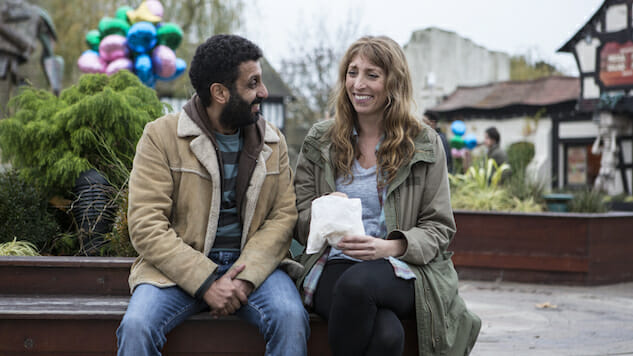Back to Life: Showtime’s British Dark Comedy Series Is a Soulful Treasure
Photo Courtesy of Showtime
Miri Matteson (Daisy Haggard) sits listening to her bored parole officer Janice (Jo Martin) as the latter reads from a general form: “if you are feeling depressed or have a crippling feeling of deep hopelessness …” Janice then pauses and takes a moment to flip the page, continuing, “…it’s normal.” Miri gives a wan smile and nods. Like the exceptional SundanceTV series Rectify, Showtime’s Back to Life picks up when the 30-something Miri returns to her small hometown after being in prison for 18 years. But this series never flashes back to that time, because Miri’s focus is on starting over and getting a second chance—if only anyone would let her actually achieve it.
The charming and wryly funny series (running an economic six half-hour episodes) is also created by Haggard and co-written by Laura Solon. The duo take the familiar canvas of a small British seaside town where a crime was committed and everyone has secrets, and subverts our expectations of where the story goes next. Yes there is something of a mystery as far as what Miri did, but the script has fun playing with our assumptions (like having Miri’s mother Caroline, played by the great Geraldine James, pluckily hiding the knives before she comes back downstairs). Neighbors write terrible messages on the family’s fence, they harass Miri or whisper like cowards about rumors they’ve heard. But through it all, Miri puts on a brave if exasperated face, appreciating her freedom and hoping that someday people can forget what she did.
Like with Fleabag (also produced by Harry and Jack Williams), the key to Back to Life’s success is how it dances along the line of humor and grief, like when Miri returns to her room—untouched since she was a teenager—and sees posters of David Bowie, Jimi Hendrix, and Michael Jackson. “Last one standing,” her mother says, gesturing to a bedside poster of Jamie Oliver. “Thank God he’s still with us,” Miri replies. In a late episode moment, Miri notices that her parents have made a cup of tea for an effigy doll of her that someone left in their front garden. “Well she was cold,” her mother says, almost breaking into a laugh—I nearly did the same. Back to Life is a quiet and emotionally genuine series that hinges on the fantastic interactions among its characters. It examines the fallout of this past tragedy through the mundanity of daily life, including the lies we hold on to that mask truths we don’t want to confront.
-

-

-

-

-

-

-

-

-

-

-

-

-

-

-

-

-

-

-

-

-

-

-

-

-

-

-

-

-

-

-

-

-

-

-

-

-

-

-

-








































